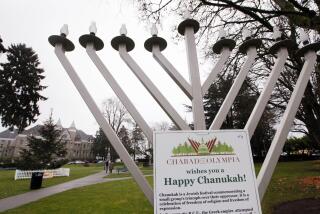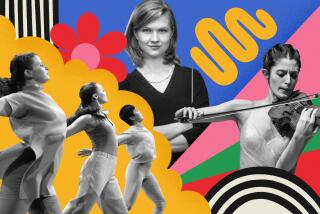The Klezmer Man
- Share via
It must be a small world, after all, if traditions as distant as raging Orange County surf-rock and klezmer, the folk music of vanished Jewish villages of Eastern and Central Europe, can intersect.
The point of unlikely conjunction is “Miserlou.”
Dick Dale’s epic version from 1963 is one of rock’s instrumental classics; its fast, pummeling guitar attack zoomed back into mass-public consciousness when Quentin Tarantino made it the theme music for 1994’s “Pulp Fiction.”
On “Dancing in the Aisles,” the latest album from the Klezmer Conservatory Band, “Miserlou” returns at a slow, loping, caravan gait, with lyrics, in Yiddish, that pine for an alluring but elusive dancing girl named Miserlou.
Hankus Netsky, who founded the Boston-based group in 1980, says that “Miserlou,” originally a song in Arabic, has been in the klezmer repertoire since the 1920s.
“People go wild when you play it at Hasidic weddings,” Netsky, 42, said in a phone interview recently from his home in Newton, Mass. “In the Hasidic community in New York, these days when people ask for a hora [line-dance tune], they don’t mean ‘Hava Nagila,’ but ‘Miserlou.’ ”
(Dale said he first learned “Miserlou” in its slow version, sung in Arabic, at gatherings of his father’s Lebanese family when he was a boy in Massachusetts. “It’s good they’re doing something like that,” he said of the klezmer rendition, adding that any note of commonality between Arabs and Jews can only help these days.)
The Klezmer Conservatory Band, which plays Saturday at the Irvine Barclay Theatre, has had an important role in proving that klezmer music could travel well in the modern world, after most of the Jewish immigrant players who brought it to America in the late 19th and early 20th centuries had given it up as a lost cause.
The KCB still plays the occasional bar mitzvah or wedding--whether for families in the Hasidic community or for such celebrities as David Mamet--but lately it has seen some of the world’s fancier concert venues. Since accompanying violinist Itzhak Perlman in 1995 on an Emmy-winning PBS special, “In the Fiddler’s House,” the KCB has recorded two albums and periodically toured with the acclaimed classical musician.
It shouldn’t be a surprise that klezmer can make its way in such varied settings or that it can borrow widely for its repertoire, Netsky said.
“ ‘Klezmer’ just means ‘musicians’ in Yiddish. The genre is impossible to pinpoint. People came up with the term ‘klezmer music’ for music with roots in the Eastern European Jewish wedding or celebratory traditions. But you can get bands that can do [jazz-like] improvisations on Hasidic niggunim [melodies] or that sound like rock or that sound more like Eastern European bands, and it’s all called klezmer.”
*
The Klezmer Conservatory Band composes some instrumentals but mainly mines material from recordings popular in the Yiddish-speaking American Jewish community before World War II.
“At a point where klezmer music could have gone somewhere, people just threw it out,” Netsky said. “You had assimilation, modernism generally, with people not wanting to be associated with these old things, and the Holocaust, which wiped out the source of the music. [It became] associated not only with old-fashioned people who couldn’t speak English, but with something that was completely dead. It [became] hard to celebrate with [music] associated with this culture that’s completely wiped out.”
Growing up in Philadelphia, Netsky, who plays saxophone and accordion in the KCB, knew that his uncles and grandfather had been klezmer musicians. But they wouldn’t teach him what they knew.
“It was as if they thought they would be transmitting poison. They thought they would be doing a disservice, because where was I going to go with it? I’d starve like they did.”
*
At 19, Netsky met an uncle who was willing to share old records. Later, Netsky invited musicians at the New England Conservatory of Music in Boston, where he teaches improvisation, to open klezmer sessions.
Netsky, singer Judy Bressler and bassist James Guttmann remain from the original band; Netsky said that most of the current 11-member lineup has been in the KCB for the greater part of its 18-year run.
The Klezmer Conservatory Band helped seed a klezmer revival: Alumni have gone on to form their own groups, including the Klezmatics and Brave Old World, both of which record for national labels. Along with the Andy Statman Band, those groups have joined the KCB for an ongoing series of round-robin concert performances with Perlman, in which each band in turn accompanies the violin soloist.
Another KCB alumnus, clarinetist Don Byron, has made a name as a solo artist playing klezmer-influenced jazz.
Netsky doesn’t make all the Klezmer Conservatory Band’s gigs nowadays. He is too busy trying to conserve klezmer, seeking out old Jewish musicians, and their children, who might have recordings, sheet music or information that can help him expand the repertoire and fill in gaps in the music’s story. It’s part of his doctoral work in ethnomusicology at Wesleyan University. Netsky, a very busy man, also carries a full teaching load at the New England Conservatory and helps in raising two children.
“I think the dissertation I’m writing [and one by another scholar] are the first on this music,” he said. “When I first went to research klezmer music, most books on Jewish music [portrayed it] as if it had died out in the mid-1800s, because there was so little interest in it among Jewish music scholars. It’s only being taken seriously now.”
Even his Uncle Marvin, one of the family members who rebuffed him, has taken up his trumpet again, joining his nephew and some of his old associates to record as the Philadelphia Klezmer Heritage Ensemble.
*
There’s probably an old Yiddish folk saying that would sum up the rebirth of klezmer music, but some of the wisdom of Yogi Berra seems to fit: It isn’t over till it’s over.
Or, as Netsky put it: “Any music that’s good can be rediscovered at any point and become the basis for further development.”
*
One new development for the KCB will be its first performing trip to Israel, scheduled for June.
“I don’t think Israel has been as interested in importing Jewish culture. They have enough Jewish stuff; they import Madonna and Michael Jackson. But we’ll get there, and they’ll see what they don’t have.”
* The Klezmer Conservatory Band plays Saturday at the Irvine Barclay Theatre, 4242 Campus Drive. 8 p.m. $23-$27 Sold out. (714) 854-4646.
More to Read
The biggest entertainment stories
Get our big stories about Hollywood, film, television, music, arts, culture and more right in your inbox as soon as they publish.
You may occasionally receive promotional content from the Los Angeles Times.











